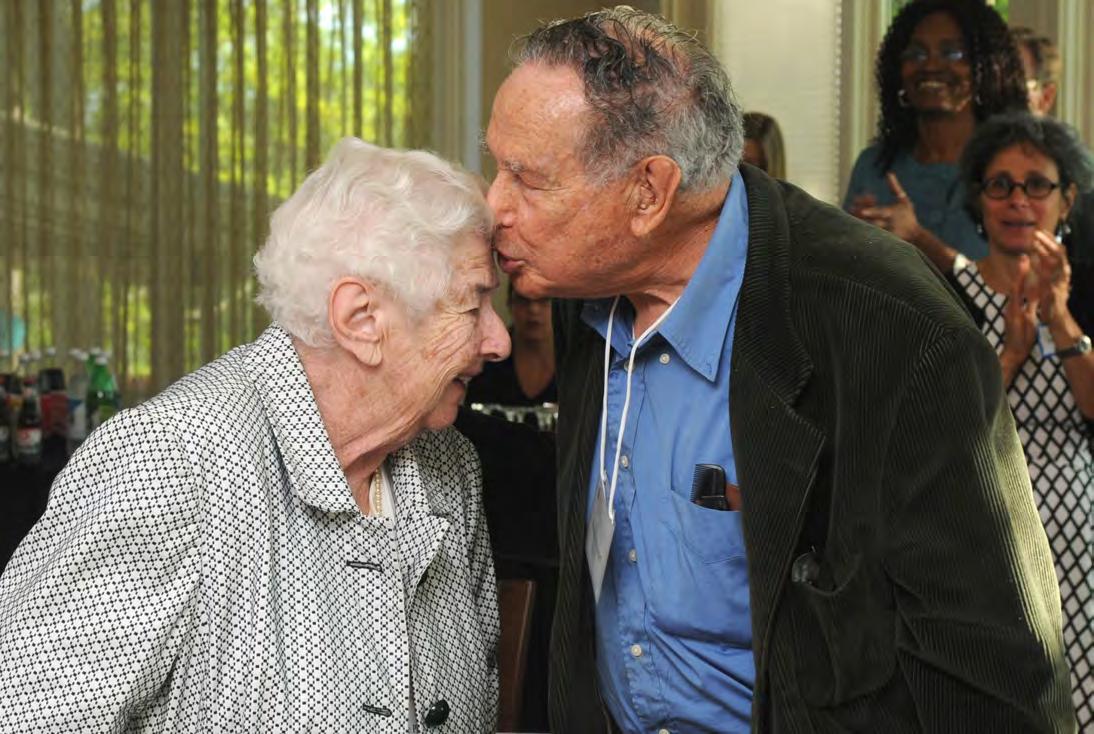
4 minute read
Howard Parad’s Gentle Vision
Dean Parad and his family modelled balanced approach to learning and scholarship
As Dean of Smith College School for Social Work from 1956 through 1971, Howard Parad, M.S.W., Ph.D., shepherded the School through turbulent times for the country and intellectually stimulating times for social workers.
Parad, who died at his Florida home Sept. 2, 2019 at age 96, enjoyed a distinguished career as a lecturer, teacher, mentor, practitioner and scholar. He made indelible contributions to the field throughout his career, but those who knew him best say his years at Smith remained among the most meaningful to him.
“It was his favorite job,” confirmed his wife, Libbie Parad, 96.
“He loved everything about it, the colleagues, the community,” agreed their son, Jonathan.
During their 77-year marriage, Howard and Libbie shared an enduring, and uncommonly equal for the times, professional collaboration in which they coauthored books and articles.
“My father would be the first to say that my mother was half the team,” said Jonathan. “He could not have done it alone.”
Libbie and Howard married in 1944, though Libbie notes that they first met in kindergarten. As colleagues, she said, they loved working together on projects meaningful to both of them.
“He would write an article and give it to me and I would read it and I would say, ‘It’s very good, but it’s two or three articles,’” she said. “And I would edit— it made it much more readable.”
SSW Professor James Drisko, M.S.W., ’77, Ph.D., said Parad’s biggest contribution to the field was the groundbreaking and innovative work he and Libbie did on crisis intervention theory and practice.
“This was a massive change,” said Drisko. “They wrote several books and were practically leaders in the ’60s and ’70s in this whole endeavor.”
The work helped pave the way to greater access to services and, Drisko believes, a reduction in stigma surrounding people seeking out mental health treatment. There was a greater understanding and acceptance, he said, that “you may need help with everyday life stuff.”
Though Drisko earned his master’s degree after Parad had left the Pioneer Valley, he got to know Parad through professional organizations as well as the School’s alumni association.
When Parad was named dean, the young couple didn’t realize what the job would entail, or that much of it would involve fundraising for the institution.
Libbie said while that was not his favorite part of the job, her husband rose to the challenge. He became particularly enthused about raising funds for a scholarship program that enabled the School to become more diverse and accessible to more students of color and low-income students.
“Anyone who was a really good student could get a scholarship,” said Libbie.
Under Parad’s leadership, the School started a doctoral program in 1964. Known for his promotion of the Smith College Studies in Social Work journal, Parad brought big names in the field to campus, recruiting beloved faculty members including the late Professor Emeritus Roger Miller, M.S.W., Ph.D., developing close relationships with students and encouraging their research.
Alum Mary Hall, M.S.W. ’66, said it was an intellectually challenging and exciting time to enter the social work profession.
In those years, students and faculty dined together family-style, she recalled. Because she had a habit of arriving for dinner on the later side, she frequently found the only seat left vacant was at Parad’s table where he would be eating with Libbie and their children.
As an African American student with no first-hand experience relating to white families, Hall said it was an eye-opening and unusual experience.
“From my point of view, it was an intimate look at a white family,” she said.
And observe she did, noticing that Howard and Libbie Parad had a much different parenting style than what she was accustomed to, with their children enjoying freedoms she didn’t realize children could have.
“The children were very chatty and they had no hesitation stating their opinions,” Hall recalled. “They asked a lot of questions.”
As parents, “they were child-centered,” she said, and Parad was kind and patient with his children.
Though she initially felt under the microscope, possibly even intimidated, to be eating dinner with the dean, she adjusted to the situation.
“I felt very accepted by him,” she said. “I learned to feel very comfortable being there.”
After his tenure at SSW, Parad went to the University of Southern California, where he taught and led research projects while maintaining a successful private practice. Libbie Parad, meanwhile, ran an agency that provided psychological services to children.
For the Parad family, the Pioneer Valley always felt like home, though, as they returned for extended stays in the summer to enjoy property they own with close friends at a lake in Goshen.

Marie Singer, ’47 and Howard Parad exchange smiles.
“The understanding was that this was our home. My father was always very proud of Northampton and its progressive values,” said Jonathan.
Meanwhile, it’s worth noting that the three Parad children, Harry, Jonathan and Sarah, followed in their parents’ footsteps professionally.
“[Since my parents and siblings] are all in the mental health field,” said Jonathan, “we talked shop whenever we were together.”
If indeed it’s true that imitation is the sincerest form of flattery, that is perhaps evidence of their parents’ devotion to their work and the contributions to the field of social work.—Laurie Loisel








